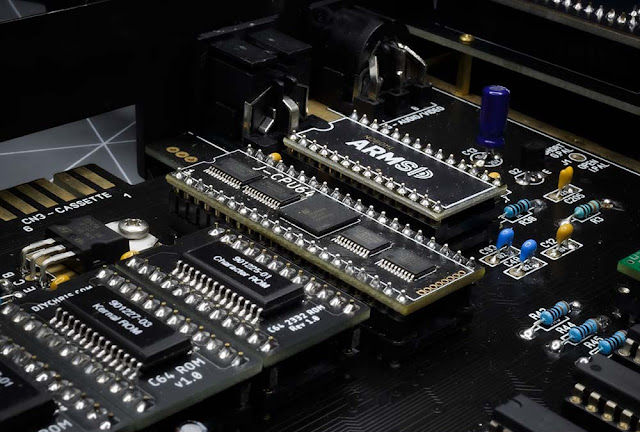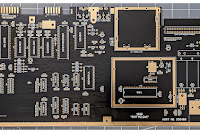As I have mentioned many times in the past, one of my goals with my Commodore 64 projects was to have a machine consisting of 100% new parts. Mostly for the fun of it but also just plain old curiosity, to see if it could ever be done.
Well today I get one step closer to that goal as the J-CPU by Jani Laatikainen finally arrived.
This is a direct replacement for the original MOS 6510 CPU originally found in the Commodore 64. There are no jumpers or solder pads requiring my attention; one simply extracts the original CPU from the computer, and push in this replacement (assuming your C64 board is socketed, which mine is). Pin one and the alignment notch are clearly marked on the silkscreen so there's no reason anyone should mess this up unless they're really, really not paying attention.
Once in, that's it, you're good to go and theoretically, if everyone has done their job properly, it should just work.
There are two LVC8T245 Bus Transceivers, two AHCT245 Bus Transceivers, and one ICE40HX4K Lattice FPGA doing the very clever parts and a plethora of tiny surface mount capacitors, resistors and diodes on the underside doing other clever stuff. The first thing that strikes me about all this is how much care I'll need to take if I ever want to remove the J-CPU64 from my board - it will be all too easy to accidentally break one of those components on the underside with any sort of extraction tool.
However, removing it is a problem for future me. Getting it onto the board doesn't pose any sort of problem and so far, as intended, it does indeed just seem to work with every demo and game I've thrown at it so far. This is great news for me but doesn't make the most interesting read. As I always say though, it's very early days and there's plenty time for this to fail, or encounter something it doesn't like. Time will tell and I'll update this article if I encounter such a thing.
The J-CPU64 is advertised as having "Lower power requirements, less heat!" I can't find any figures to back this up, but it's certainly true that while the original 6510 got warm in my build, there is no detectable heat coming from the J-CPU. Again though, despite getting toasty, the 6510 I replaced has been functioning perfectly for 40 years. Will this last as long?
Additionally, this may seem a trivial point but I cannot let it go unsaid: I am freaking delighted this comes in a sensible black solder mask.
Vic-II Kawari,
TOLB,
PLAnkton EV and
SaRuMan - these green replacements stick out like a sore thumb on my board and I really, really,
really don't like it.
Now whilst everything seems to work, I do however have a serious question about quality control from the seller. On first unboxing initial inspection revealed a few disappointing issues. I happened to order two J-CPU's. The first thing I noticed I'll come back to in a moment. The second thing I noticed was the amount of uncleaned flux over everything. The third thing I noticed was when I got the macro lens out to take the photographs above and saw just how much dust and tiny fibres were covering everything - way more than I've ever seen on brand new parts before. Honestly, it looked like these had been stored on the floor of a Benghali sweatshop and both J-CPUs were covered in it. That, however, is easily fixed with a bath of isoproyl alcohol, the real kicker was that first issue:

As you can clearly see, the supporting plastic on pin 1 of one of my fresh-out-the-box J-CPUs has been gouged or broken away, leaving the strength of this pin questionable. Electrically, it'll work fine as this has no effect on signal integrity, and the solder and the plastic that remains will probably hold it in place just fine, but there is a reason these pins are meant to be completely shrouded in their plastic and the fact that this has passed quality control both at fabrication, and by the seller, well it's just a damn poor show. And this is not the first time I've had a quality control issue with this particular seller either, who I won't name. That said, should it have proved necessary, I'm quite certain I could have arranged with the seller to have this replaced. As it happens, I am perfectly able to fix this myself (even if I shouldn't have to) and don't need to go to the hassle.
 |
| My all new Commodore 64 with no MOS ICs |
Disappointments aside, this means that for the first time ever I no longer have any original MOS chips in my SixtyClone C64. As of now it is entirely possible to construct a C64 board from the ground up with brand new parts which are (for the moment) easily available. This is an astonishing achievement, by some very smart people. As previously stated, whether these replacements will last for 40 years, like the originals they supplant, well, that remains to be seen.
As for my ultimate goal, well I'm still waiting on a brand new keyboard so that absolutely everything about my SixtyClone C64 is new, and this appears to be in hand with
CBMSTUFF's "Blingboard"
Indigogo campaign which I decided to back, in full knowledge of the risks of crowdfunding. The target for completion of this campaign is said to be September 2024, but I expect this to be somewhat delayed (they usually are) so if I see this before September 2025 I'll be a happy man. Add a couple of years to that if there's another worldwide pandemic.
Note from the future: I append this in September 2025 and exactly as I predicted, the Blingboard campaign has yet to deliver. No pandemic this time, just an entirely foreseeable litany of (frankly amateur-ish) production problems which all stem from low volume keycap production requirements. Jim Drew (the individual behind CBMSTUFF) tells us that because he has now secured a deal with the newly resurrected
Commodore to produce keyboards for the new Commodore 64 Ultimate range, this massively increased the volume of keycaps required, resulting in a somewhat more "professional" company accepting the order. As a result I, and the many hundreds of other backers,
may take delivery towards the end of 2025, but I'm not holding my breath.
Total Cost Update
It's become something of a tradition to keep track of my expenditure, highlighting my total costs from first getting the SixtyClone board and initial materials, all the way to adding modern component replacements as they become available. As we strive boldly towards my end goal of building an all new Commodore 64, I must add the price of the J-CPU to my horrendous total build cost.
As I mentioned, I bought two J-CPU's but will only include the price of one, because one is all my board requires. Including shipping, two J-CPU's came in at €94.70 (80.56 GBP or 102.31 USD). Half of that is £40.28. which brings the cost of my SixtyClone so far to:
£1,230.36, or $1,612.04 or €1,446.79 approx.
Wow. Just wow.








